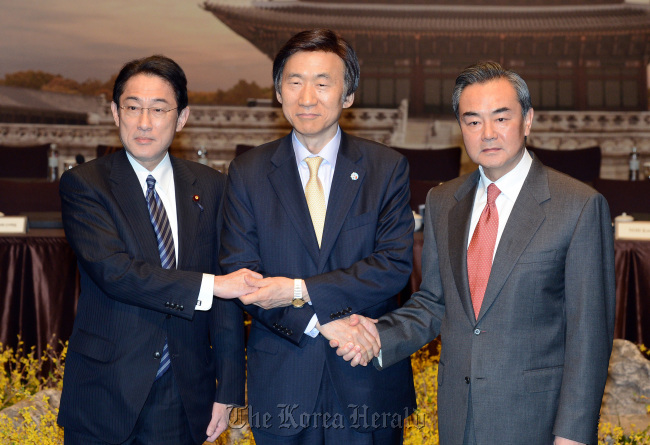Japan on Thursday expressed its resolve for discussions to arrange a trilateral summit with South Korea and China, while the U.S. lauded the three countries’ efforts to mend fences in the face of steadfast historical and territorial tension.
Presidents Park Geun-hye and Xi Jinping announced after their meeting on Wednesday they will meet with Japanese Prime Minister Shinzo Abe in Seoul in late October or early November. The event is also likely to set the stage for first-ever talks between Park and Abe.
“We’re hoping to have further communication with China and Korea to fine-tune the date, venue and other details about the meeting,” Japan’s Chief Cabinet Secretary Yoshihide Suga said at a news briefing in Tokyo.
On the bilateral summit with Park, he added that Tokyo will respond positively “if the other side makes a request,” as it has been saying they need talks to resolve problems.
 |
Seoul’s Foreign Minister Yun Byung-se (center) and his Chinese and Japanese counterparts, Wang Yi (right) and Fumio Kishida, pose after their meeting on March 22 in Seoul. (Yonhap) |
Washington relayed support for better relations between the three neighbors, while lauding the agreement between Park and Xi to work more together for an early restart of six-party talks aimed at denuclearizing North Korea.
“We believe that good relations among countries in the region promote peace and stability and are in their interests and in the interests of the U.S.,” State Department spokeswoman Katina Adams said in her commentary.
“The U.S. is committed to working with its partners and allies in the region to achieve consensus on the terms for authentic and credible negotiations to implement the September 2005 Joint Statement and bring North Korea into compliance with applicable Security Council resolutions through irreversible steps leading to denuclearization.”
Seoul, Beijing and Tokyo launched the gathering in 1999 to boost cooperation on Pyongyang’s nuclear threats, trade, sociocultural exchanges and other fields. But the summit has not taken place since May 2012 as spats escalated between China and Japan over remote islands in the East China Sea, Abe visited a controversial war shrine and spurred his revisionist push.
In a bid to revive the initiative, their foreign ministers had their first consultations in about three years in March.
The reconciliatory move came as South Korea has been stepping up efforts to mend icy relations with Japan, partly to soothe the U.S.’ pressure over the prolonged strain between its top two regional allies and views about Seoul’s deepening partnership with Beijing whose rise and growing assertiveness remain a source of concern for Washington.
Abe, for his part, had apparently attempted to carry a more remorseful tone in his Aug. 15 statement marking the 70th anniversary of its defeat in World War II, though it stopped short of offering a new apology and thus incited criticism at home and abroad.
By Shin Hyon-hee (
heeshin@heraldcorp.com)








